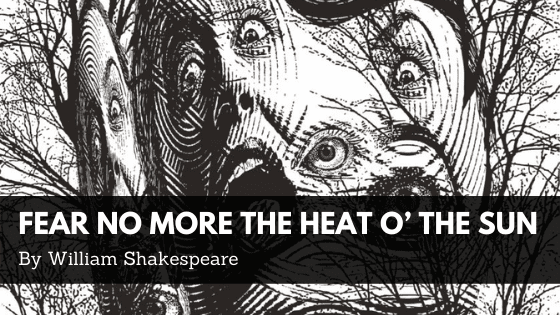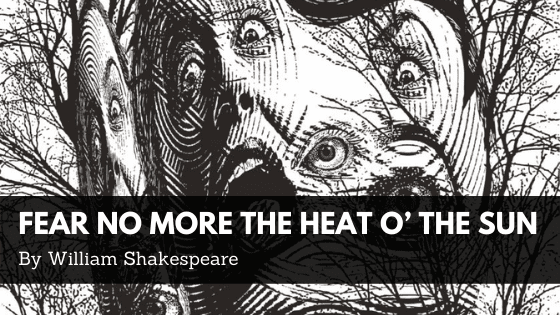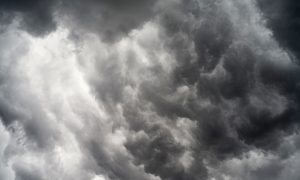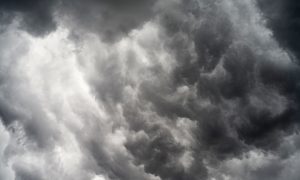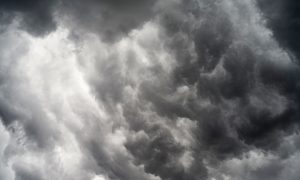Fear No More The Heat O’ The Sun
Fear no more the heat o’ the sun,
Nor the furious winter’s rages;
Thou thy worldly task hast done,
Home art gone, and ta’en thy wages:
Golden lads and girls all must,
As chimney-sweepers, come to dust.
Fear no more the frown o’ the great;
Thou art past the tyrant’s stroke;
Care no more to clothe and eat;
To thee the reed is as the oak:
The scepter, learning, physic, must
All follow this, and come to dust.
Fear no more the lightning flash,
Nor the all-dreaded thunder stone;
Fear not slander, censure rash;
Thou hast finished joy and moan:
All lovers young, all lovers must
Consign to thee, and come to dust.
No exorciser harm thee!
Nor no witchcraft charm thee!
Ghost unlaid forbear thee!
Nothing ill come near thee!
Quiet consummation have;
And renownèd be thy grave!
by William Shakespeare
Ever Had Such a Fear?
Have you ever feared heights, crowds, wild animals, street dogs, loneliness, water, or any other thing? They give these fears fancy names these days such as aerophobia, claustrophobia, autophobia, hydrophobia, homophobia, etc.
We all have some phobias/fears or others. However, they say, the fear of death or Thanatophobia is the biggest of them all. I am not really sure though.
My Story
A couple of weeks back, I developed a lump around the lower portion of my neck. There wasn’t any pain or any other discomfort so I ignored it for a week. But when my mother noticed it, she immediately took me to a doctor. The first reaction of the doctor really scared my mother.
At first, he gave me the antibiotics for five days and said to get these blood tests and other tests done once the course is done. And then he changed his mind and suggested that I get the tests done the same day and get the reports by the next day. So that he could be “tension-free” and proceed with the treatment.
I knew, he was worried if it was Cancer or TB. But I wasn’t really worried. In my dreams, I remember I was writing my final letter to be sent to all my friends and family members. A ‘final goodbye’ maybe, in case we don’t ever meet again. I don’t remember the exact words that I was typing. But I do remember after writing a couple of paragraphs, I thought I should give this letter a title. And I titled it “AB TUMHARE HAWALE WATAN SATHIYON” (in Hindi), meaning “I pass on the torch of this world to your hands”.
When I woke up I was laughing at it. My father had told me “nothing is going to happen to you, this is just a bacterial infection”. My father is no doctor but I believed him.
The next day, of course, nothing happened, reports were there and it was just a bacterial infection. But what was really shocking was, I had a message from one of my father’s friends, enquiring if I was fine. So did my father tell everyone about it?
It turned out that he had gathered all the information about the best hospitals where he could get my Cancer treated. While I was free from fear of death, my father did fear. The fear of losing his daughter.
So here is what I learned from this episode, bigger than the ‘fear of death’ is the ‘fear of losing your people’.
William Shakespeare

William Shakespeare (26 April 1564 – 23 April 1616) was an English poet, playwright, and actor, widely regarded as the greatest writer in the English language and the world’s greatest dramatist. He is often called England’s national poet and the “Bard of Avon” (or simply “the Bard”). His extant works, including collaborations, consist of some 39 plays, 154 sonnets, two long narrative poems, and a few other verses, some of the uncertain authorship. His plays have been translated into every major living language and are performed more often than those of any other playwright.
Shakespeare was born and raised in Stratford-upon-Avon, Warwickshire. At the age of 18, he married Anne Hathaway, with whom he had three children: Susanna and twins Hamnet and Judith. Sometime between 1585 and 1592, he began a successful career in London as an actor, writer, and part-owner of a playing company called the Lord Chamberlain’s Men, later known as the King’s Men. At age 49 (around 1613), he appears to have retired to Stratford, where he died three years later. Few records of Shakespeare’s private life survive; this has stimulated considerable speculation about such matters as his physical appearance, his sexuality, his religious beliefs, and whether the works attributed to him were written by others.
Shakespeare produced most of his known works between 1589 and 1613. His early plays were primarily comedies and histories and are regarded as some of the best work produced in these genres. Until about 1608, he wrote mainly tragedies, among them Hamlet, Othello, King Lear, and Macbeth, all considered to be among the finest works in the English language. In the last phase of his life, he wrote tragicomedies (also known as romances) and collaborated with other playwrights. Many of Shakespeare’s plays were published in editions of varying quality and accuracy in his lifetime. However, in 1623, two fellow actors and friends of Shakespeare’s, John Heminges and Henry Condell, published a more definitive text known as the First Folio, a posthumous collected edition of Shakespeare’s dramatic works that included all but two of his plays. The volume was prefaced with a poem by Ben Jonson, in which Jonson presciently hails Shakespeare in a now-famous quote as “not of an age, but for all time”.
Throughout the 20th and 21st centuries, Shakespeare’s works have been continually adapted and rediscovered by new movements in scholarship and performance. His plays remain popular and are studied, performed, and reinterpreted through various cultural and political contexts around the world.
To read more about William Shakespeare, click here.
Fear No More The Heat O’ The Sun – Analysis / Summary
This song is a very famous song from the play Cymbeline. It simply means that you need not really fear death. Death is inevitable. Each one of us, be it royalty or the common class, everyone eventually will “come to dust”. All that we do and all that we become will lose its existence one day. And we need not fear it.
However, the most powerful state is death. Once you attain it nothing can harm you and you shall fear no more. Once you attain this state, “nothing ill come near thee”. You no longer have to fear the hardships of life.
This song was sung, in the play, over the dead bodies of Cloten and Fidele. Fidele is actually the heroine of the play, Imogen disguised as a boy and is only under the influence of drugs and not dead. The song is actually sung by Guiderius and Arviragus, the sons of Cymbeline in the play and half-brothers to Imogen.
To read more famous poems by the finest writers ever, click here.
